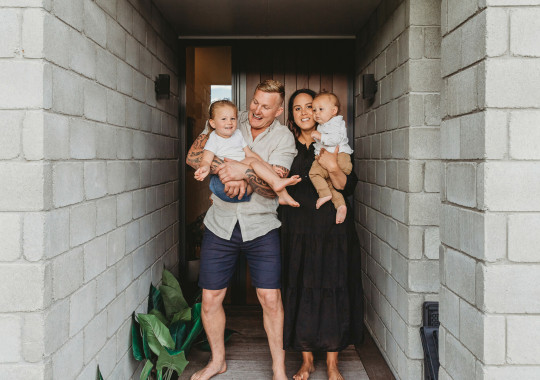Affordable Rental Pathway
Last updated: 30 August 2022 The Affordable Housing Fund’s Affordable Rental Pathway offers grant funding to not-for-profit organisations to deliver newly built affordable rental housing.
It’s often too expensive to build or sustain new housing and offer rent at a rate that is affordable for lower income people and whānau. The Affordable Rental Pathway helps to address this by offering funding to make these projects financially viable.
These affordable rental homes will be for lower income people and whānau who can’t afford market rent but can’t access or don't need public housing.
Not-for-profits include organisations such as community housing providers, iwi and Māori housing providers, councils, and charitable trusts.

Round one of the Affordable Rental Pathway
Round one of the Affordable Rental Pathway offered $50 million of grant funding in six locations with the greatest need for an increased supply of affordable rentals for those on lower incomes. These locations included:
- Auckland
- Tauranga-Western Bay
- Rotorua
- Napier-Hastings
- Wellington metro (including Wellington, Porirua, Lower Hutt, Upper Hutt and Kāpiti), and
- Nelson-Tasman.
Proposals have been received and assessed and funding decisions have been confirmed subject to contracts being confirmed.
Round two of the Affordable Rental Pathway
Round two of the Affordable Rental Pathway has made a further $100 million available for affordable rental developments across New Zealand, prioritising developments in areas with the greatest need for affordable housing.
This funding will enable 174 affordable rentals around the country through 9 new partnerships with providers under the Affordable Housing Fund.
Rents for the homes are expected to be less than 80% of the median market rent for the type of home.
Further applications are currently in the final stages of evaluation.
The successful providers
Northland region - $5.1 million for 16 new houses will be shared between:
- Te Pae ki te Rangi Limited Partnership up to $3.2 million to develop 10 affordable rental homes.
- Tambourine Trust up to $1.9 million ($1,858,683) to develop six affordable rental homes.
Bay of Plenty region - $21.4 million for 64 new houses will be shared between:
- Western Bay of Plenty District Council up to $6.6 million ($6,556,534) to develop 26 affordable rental homes.
- Home in Place NZ Limited up to $11.2 million ($11,223,075) to develop 28 affordable rental homes.
- Tauhara North Kāinga Limited up to $3.6 million ($3,582,245) to develop 10 affordable rental homes.
Hawke’s Bay region $22 million for 65 houses will be shared between:
- Te Taiwhenua o Heretaunga up to $14.8 million ($14,816,128) to develop 26 affordable rental homes.
- Hastings District Council up to $7.2 million ($7,187,887) to develop 39 affordable rental homes.
Blenheim region - $2.2 million for five new houses will be allocated to:
- the Marlborough Sustainable Housing Trust to develop five, 4-bedroom houses comprising of two duplexes and one stand-alone dwelling.
Christchurch City - $6 million for 24 new houses will be allocated to:
- the Ōtautahi Community Housing Trust in partnership with Paenga Kupenga, the economic arm of Ngāi Tūāhuriri Rūnanga for a mixed tenure development.
-
Eligibility criteria for the Affordable Rental Pathway
To be eligible for the Affordable Rental Pathway, an organisation must be a not-for-profit organisation that can demonstrate capability to develop, maintain, and operate affordable rental homes.
Organisations must be able to identify a specific project where they:
- intend to create new supply of privately-owned rental homes, including by developing new homes, purchasing turnkey homes off the plans, completing commercial conversions to an as-new standard, or relocating homes
- have identified a specific parcel of land, and have a pathway to owning, leasing, or occupying the land, including whenua Māori
- intend to offer rents that are affordable for their target cohort, which they will need to demonstrate.
Projects must either deliver:
- a minimum of 10 homes (dwellings) or homes with 20 or more bedrooms in Auckland, Wellington metro, greater Hamilton, greater Christchurch and Tauranga-Western Bay of Plenty
or
- five homes or with 10 or more bedrooms in other target regions.
These homes must be offered as long-term rentals to provide tenants with security of tenure, as opposed to short-term leases.
For the Affordable Rental Pathway, dwellings include detached houses, flats, units, townhouses, apartments, and papakāinga, which may be stand alone or joined together. Dwellings also include parts of premises that are largely self-contained. For example, a room or rooms with a kitchenette and an ensuite that the tenant has exclusive rights to occupy, alongside the shared use of common areas and facilities. There must be at least one Residential Tenancies Act tenancy agreement for each dwelling.
-
What does grant funding from the Affordable Rental Pathway cover
Grant funding through the Affordable Rental Pathway can cover costs relating to the purchase and/or development of affordable rental housing, including costs relating to:
- land
- infrastructure
- pre-development (including professional services)
- the house construction/vertical build
- project support costs
- feasibility studies where these can be directly attributed to the build of this housing.
It excludes:
- ongoing operating costs
- standalone pre-development costs of other projects (including feasibility studies) or
- any costs associated with wrap-around support services.
The amount of funding will vary, depending on the contributions of the applicant and other financial institutions, and based on a demonstrable need. We would expect to fund up to 50 per cent of the project costs.